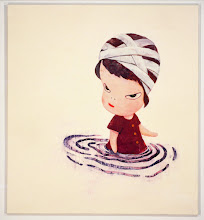 Thomas Bangs Thorpe (1815-1878) is best known today for his "Old Southwest" humor writings, particularly "The Big Bear of Arkansas," a minor masterpiece of backwoods myth-making that gets included in quite a few American Literature anthologies. In 1854, he published a purportedly "reformist" novel about slavery under the pen name Logan (selected chapters are supposed to be available here - though the site doesn't seem to be working). The fact that this response to Uncle Tom's Cabin is called The Master's House should tell you quite a bit. The "master" in Thorpe's title is Graham Mildmay, a Northern-educated and, as his ridiculous surname telegraphs, politically moderate Louisiana planter with a cute New England wife, "happy slaves," adoring animals, etc. Mildmay is not much of a protagonist, and much of the novel is taken up with subplots involving the lower class whites in his orbit - slave traders, slave catchers, overseers, backwater colonels, riffraff with names like "Toadvine." The basic premise of the novel is that unpropertied whites have made slavery unsustainable. Their lazy, vicious, and corrupt life style offends the sensibility of their genteel neighbors and, more importantly, endangers these neighbors' property, i.e. their slaves. Appropriately, the pivotal event in the book is the accidental killing of a slave by an inept, drunken overseer, who is later acquitted by a jury of his socio-economic peers, over the impotent objection of Mildmay and his planter friends.
Thomas Bangs Thorpe (1815-1878) is best known today for his "Old Southwest" humor writings, particularly "The Big Bear of Arkansas," a minor masterpiece of backwoods myth-making that gets included in quite a few American Literature anthologies. In 1854, he published a purportedly "reformist" novel about slavery under the pen name Logan (selected chapters are supposed to be available here - though the site doesn't seem to be working). The fact that this response to Uncle Tom's Cabin is called The Master's House should tell you quite a bit. The "master" in Thorpe's title is Graham Mildmay, a Northern-educated and, as his ridiculous surname telegraphs, politically moderate Louisiana planter with a cute New England wife, "happy slaves," adoring animals, etc. Mildmay is not much of a protagonist, and much of the novel is taken up with subplots involving the lower class whites in his orbit - slave traders, slave catchers, overseers, backwater colonels, riffraff with names like "Toadvine." The basic premise of the novel is that unpropertied whites have made slavery unsustainable. Their lazy, vicious, and corrupt life style offends the sensibility of their genteel neighbors and, more importantly, endangers these neighbors' property, i.e. their slaves. Appropriately, the pivotal event in the book is the accidental killing of a slave by an inept, drunken overseer, who is later acquitted by a jury of his socio-economic peers, over the impotent objection of Mildmay and his planter friends.In the "funny slave hunt" episode, the slave-catcher Stubbs, on the prowl for a local runaway, crosses path with a young aspirant in the business. The older man launches into an extended meta-tale of Duckeye and Blass, two slave-hunters and their respective dog packs, who also run smack into each other while trailing an escaped slave. The dogs got to the fugitive at about the same time:
The row was tremendous, and they would have sent the [slave] to kingdom cum, if the dogs, being strangers, had not got to fighting among themselves... While the dogs was going it among themselves, and the [runaway] was crying and yelling, old Duckeye and Blass got to quarrelling about who [made the catch]... so they got to swearing and scrimmaging, and tucking into each other their bowies, and yelling and cursing, the dogs fell on 'em both, and such a row ensued as never was afore.In the commotion, the fugitive slipped away. Blass was stabbed and killed. In a turn that anticipates the trial in the novel's main frame, Duckeye got away with murder, since "it was agin the law to use the dogs and the [blacks] to swar again a white man in court." Again, typical of the novel's ideological sleight-of-hand, Thorpe takes an iconic image of racial sadism and turns it into an occasion to ridicule lower-class whites. The runaway avoids getting caught here, but he is also divested of any substance and humanity.
A couple other things worth noting here: unlike the dog in the illustration above, trotting neatly by its master's side, Duckeye and Blass's hounds are undisciplined loose cannons. Just like their fractious owners, they lose focus on their human quarry as soon as other dogs come into the picture. Belief in the social and moral isomorphism of dogs and their humans - e.g. that dogs of poor people also lack "class," etc. - is quite typical of planter class worldview, as the hunting scholar/historian Stuart Marks has shown. The mark of an antebellum gentleman hunter is a well-bred pointer or setter, a dog who moves - and stays still - with choreographic precision.
If they don't fit Thorpe's idea of a proper dog, Blass and Duckeye's packs are also rather different from the terrifying bloodhounds in abolitionist literature. Those dogs, too, carry out their master's command with perfect obedience, almost mechanistic accuracy. There is much more to say about how abolitionists imagine/represent dogs and the slave system. But for now, here's an incomplete thought: planter class advocates/apologists think that dogs ought to be perfect servants. Abolitionists think that dogs - at least the only dogs that matter in their understanding of slavery - are perfect servants, though dedicated to the wrong masters. This tells me that unpredictable, "doggy" dogs might pose a problem for the political ethology of both groups.







No comments:
Post a Comment